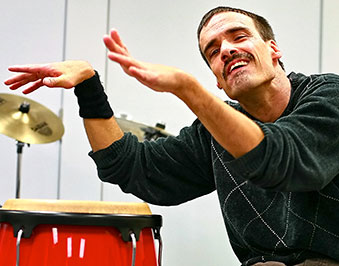Music Therapy
Music is one of the most basic human means of expression and communication. So it should be no surprise that music can be used as or in therapy to help people physically, cognitively, spiritually, and emotionally. Music therapy helps to improve quality of life and helps people to reach their fullest potential. This is the power of music therapy.
Music therapy is an internationally established therapy, developed through decades of research and evidence. Music therapy draws upon the power of making and responding to music and is delivered by accredited music therapists. Treatment is unique for each individual or group and music therapy is often used alongside other therapies.
2What happens
during music therapy?
Music therapists tap into those aspects of music that can most help people to reach their fullest potential.
A music therapy session is based on the needs and strengths of clients and might include:
- Singing and playing instruments
- Listening to music
- Moving and dancing
- Writing songs
- Improvising
- Discussing and analyzing music
- Using relaxation and/or imagery techniques
You do not need any previous music experience or ability to benefit from music therapy.
3Who
does it help?
Music therapy can help an incredibly wide range of people to address the challenges they face. It helps the young, old and in-between facing any number of challenges, including:
- Addiction
- AIDS/HIV and other terminal illnesses
- Anxiety
- Autism
- Brain injuries
- Chronic illness
- Communication challenges
- Dementia
- Developmental disabilities
- End of life
- Learning disabilities
- Neurological impairments
- Physical challenges
- Schizophrenia
- Sensory impairments
- Stress or depression
- Stroke
- Heart disease
4How
does it help?
People come to music therapy with a wide range of challenges and needs. Music therapy can move people toward reaching a number of goals, including:
- Personal development
- Exploring and resolving personal issues
- Increasing:
- self-expression
- relaxation
- mobility
- Improving:
- communication
- learning
- social skills
- motor skills
- Developing or maintaining:
The success of music therapy is based on the fact that all people, regardless of musical experience or background, have a basic ability to take in, enjoy, and respond to music. Research tells us that the brain has a memory system for music that is unique from the many other neurological systems. This makes it possible to design music therapy treatments that can effectively target non-musical functions of the brain.
5Why haven’t I heard of it before?
Although founded on decades of science and despite the fact that clients have been experiencing the benefits of music therapy for many years, it is still a relatively new profession. In Canada, the professional accreditation of music therapists began in the 1970’s. Only now is broad-based research on the mechanics of music and the brain gaining international attention and bringing the areas of music therapy and music in medicine into the public consciousness.
6Where do music therapists work?
Music therapy takes place in many settings including:
- hospitals
- long-term care homes
- schools
- group homes
- hospices and palliative care centres
- community mental health centres
- clinics like the Toronto Music Therapy Centre
The problem is, music therapy is generally not funded by the government, so it’s not happening in enough places and isn’t accessible to everyone who needs it. That’s what we’re trying to change.
As I look at the research being done around the world now — building the neuroscientific and physiologic foundation for music therapy — I feel great excitement. Music alleviating neurodegeneration, brain damage, fibromyalgia, hearing problems; music facilitating communication, inducing sleep, etcetera. The future indeed is bright for the role of music in health and well-being.
-LEE BARTEL, PhD, Director of Music and Health Research Collaboratory, University of Toronto

 Making a financial contribution to the Music Therapy Trust is the simplest and most effective way you can help us fund more music therapy in Canada.
Making a financial contribution to the Music Therapy Trust is the simplest and most effective way you can help us fund more music therapy in Canada.